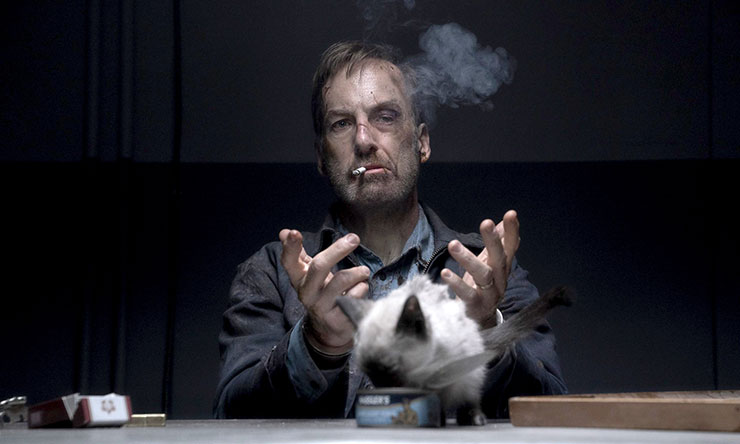
Bob Odenkirk as Hutch Mansell in "Nobody," directed by Ilya Naishuller. Courtesy: Allen Fraser/Universal Pictures.
Seventeen years and ten months. Longer than many marriages. Longer than someone's education through high school. Longer than Franklin Delano Roosevelt's time in the White House. Almost as long as the gap between the releases of “Jaws” and “Jurassic Park.”
For nearly two decades, I stood behind the desk of Blockbuster stores, from the time they were still called Blockbuster Video until the time scavengers perused the pre-viewed bins in order to buy the most merchandise on liquidation they could get their hands on. I watched children turn into teens, then young adults, as their fathers' receding hairlines gradually vanished. I made friends with the regulars, drew the ire of chronic late returners and saw my insistent pleas to be kind, rewind, fall on deaf ears. I was praised by upper management, chastised for taking too long on tasks, especially that daunting new release wall, and in 2008 found myself with my back against the wall, faced with the possibility termination despite my years of steadfast loyalty. I chose relocation instead.
“Your goal is entertainment, not profit,” my first boss drilled into his staff. Fast forward to 2012, and we are firmly advised to sell Dish Network memberships. I was fortunate enough to work in stores with more diverse selections than the company's reputation suggested. I broadened my movie horizons, developed a big callus on my right knee from carrying and reshelving those large stacks of trademark black storage cases with the white sleeves. Despite frequent hand washing, I caught nearly every bug that made its way through those entrance doors.
Working at Blockbuster might have sounded like the ideal job for a film buff studying the field in college and grad school, but as a longtime place of employment, it devolved into a place where misery came to set up shop, a minefield of sales quotas, passive aggressive threats and backstabbing that I stubbornly stuck with because I knew my big career break was just around the corner. Aaaaany moment now. As the years passed.
It's been eight years since the last corporate Blockbuster stores closed across the country. A franchise location in Bend, Oregon, still stands, a bastion of rental store culture that has garnered a following on social media and widespread media coverage. It's a culture that is once again in vogue, triggered by Gen-Xers and Millennials' streaming fatigue, as well as curiosity from a younger generation who grew up without a Friday night trip to the video store.
Two new releases, one theatrical and one on Netflix, recall to varying degrees those halcyon days that were not as pleasant as many of you remember them. Take it from someone who had a front-row seat for far too long: sometimes it's best to leave the past behind.
“Nobody”: At the heart of many action films, and action-adjacent efforts, is a question that has been answered in myriad ways going all the way back to the silent era: what does it mean to be a man? In “Steamboat Bill Jr.” (1928), Buster Keaton's mild-mannered, surprisingly pliable college student felt compelled to prove to his dad, a gruff steamer captain, that he has what it takes to be considered a chip off the old block.
Jump to 1971, and David Sumner, Dustin Hoffman's nebbishy mathematician in Sam Peckinpah's “Straw Dogs,” finds himself terrorized by some brutish thugs in rural Cornwall, ultimately compelling him to defend his property and marriage by taking the law into his own hands, with grisly results.
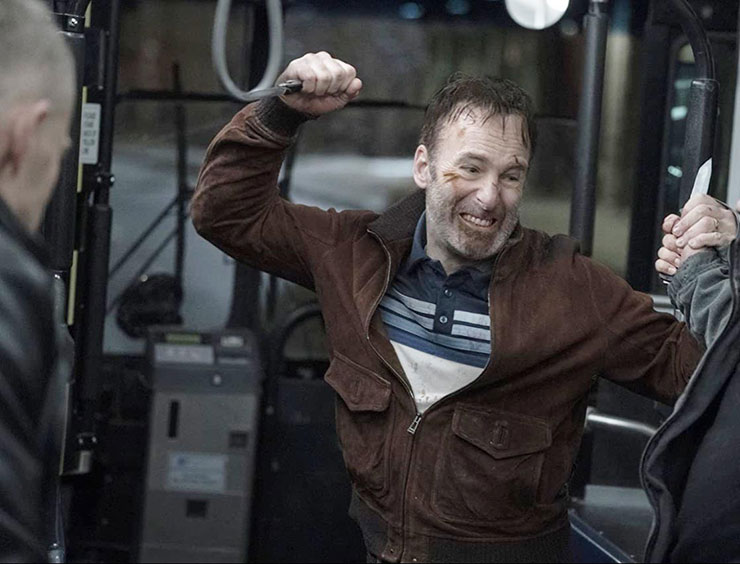
Bob Odenkirk as Hutch Mansell in "Nobody," directed by Ilya Naishuller. Courtesy: Allen Fraser/Universal Pictures.
Bob Odenkirk, best known for the fast-talking, street smart and ethically nebulous attorney he played on “Breaking Bad” and currently brings to life in the prequel series “Better Call Saul,” certainly appears to be a celluloid heir to those meek protagonists saddled with action-star duties. (Though if we're nit-picking, “Steamboat Bill Jr.” is more of a comedy with spectacular stunts, and “Straw Dogs” is more of a dark thriller that dabbles in genre mayhem.)
Odenkirk's new big-screen venture, the latest from “John Wick” creator and screenwriter Derek Kolstad, aims to do for the Emmy-winning actor, comedian and writer what the “Taken” franchise did for Liam Neeson: turn an aging star with considerable charisma into an improbable action hero. Or, in this case, a sleazier, more bruising version of one. With an overqualified cast that includes Connie Nielsen, RZA and Christopher Lloyd, it seems like a feasible goal that promises to satisfy fans of both the star and high-octane thrills.
But “Nobody” rubbed me the wrong way from the get-go. Its director, Russian filmmaker and musician Ilya Naishuller, echoes the work of Luc Besson, Guy Ritchie, “Taken's” Pierre Morel and “John Wick's” Chad Stahelski, albeit distilled through his grungier Eurasian sensibilities. The film might not be as mean-spirited as the sci-fi dud “Hardcore Henry” (2015), Naishuller's frenetic, astonishingly sexist feature debut, but there's a trail of viscera and off-putting swagger where empathy ought to be. It's an ultraviolent whiff that satiates action junkies' bloodlust in orgiastic spurts but clings to an asinine worldview that divides society into a rigid hierarchy of winners and losers.
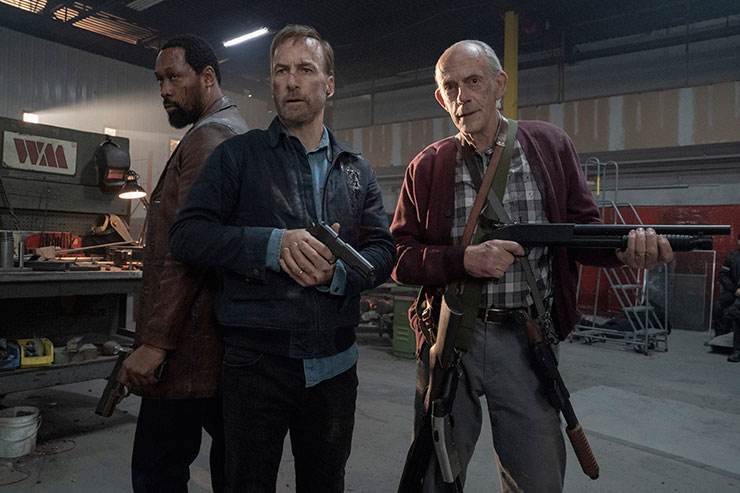
Harry Mansell (RZA), Hutch Mansell (Bob Odenkirk) and David Mansell (Christopher Lloyd) in "Nobody," directed by Ilya Naishuller. Courtesy: Allen Fraser/Universal Pictures.
The movie bends over backwards to depict Hutch Mansell, the sullen family man played by Odenkirk, as a loser trapped in suburban purgatory. Every weekday is a litany of kitchen table small talk, missed garbage pickups and contemptuous workplace exchanges, depicted in rhythmic montage fashion that rips off Edgar Wright's Cornetto trilogy while retaining none of that director's impish charm. At night, a line of fluffy pillows divides the bed Hutch shares with his wife, Becca (Nielsen), who gazes at him with disappointment. At work, Becca's dad (Michael Ironside, wasted) and brother (Billy MacLellan) make it clear that they intend to hold on to the family business, despite Hutch's goal of buying it from them. What's truly stifling here is not Hutch's white picket prison, but Naishuller and Kolstad's narrow and unimaginative portrayal of aggressively ordinary lives.
When a young man and woman break into the Mansell home in the middle of the night, Hutch has a chance to take the upper hand with a golf club but opts to let the perpetrators go, eliciting disdain and frustration from his wife and teenage son (Gage Munroe). They don't say it, but the message is clear: Hutch is a shell of a patriarch, not a real man. But the break-in triggers something inside him, and Naishuller wastes little time to reveal this suburban drone is not who he appears to be.
Enter the transit bus ride from hell, when Hutch silently witnesses a bunch of hooligans harassing passengers. Then he proceeds to beat them to a pulp, but not before issuing a warning that can't be printed here. The sequence is skillfully staged and edited, all the more effective because, despite his mano-a-mano prowess, Hutch is an imperfect brawler, perhaps because he's rusty, more likely because he's not as young as he used to be. That anything-goes uncertainty infuses a nervy urgency to the sequence that, one wishes, the rest of the film had.
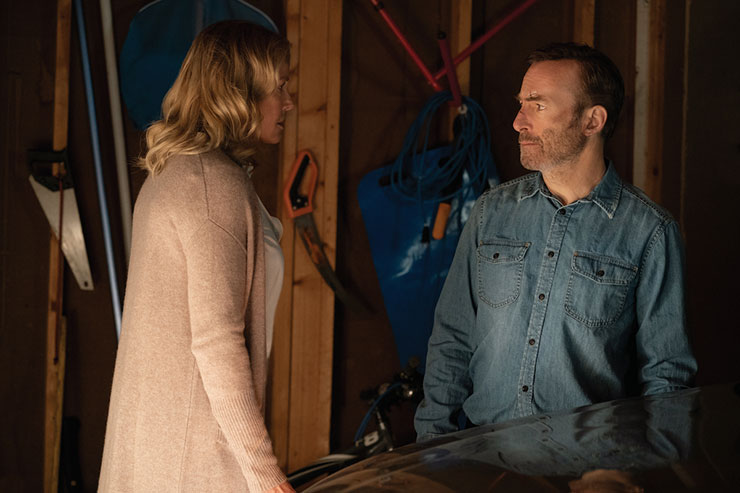
Becca Mansell (Connie Nielsen) and Bob Odenkirk as Hutch Mansell in "Nobody," directed by Ilya Naishuller. Courtesy: Allen Fraser/Universal Pictures.
But no. This is as good as “Nobody” gets. Unlike the “John Wick” movies, it feels like the work of someone who thinks political correctness is for wimps. (This is when I remind you the “Wick” movies kick major butt while showcasing a multicultural cast and even includes a gender noncorforming character.) Take Becca, for instance. She's a real estate agent who yearns for the man she married, but the character has precious little interiority to speak of. What ends up dominating the remainder of the film is an impending showdown between Hutch and Yulian (Aleksey Serebryakov), the Russian mobster who's the oldest brother of one of the jerks on the bus that Hutch put in the hospital. Other than some fun karaoke at a nightclub Yulian frequents, the character is a stock villain, loud and bloodthirsty and a total bore.
Lloyd and RZA fare somewhat better as Hutch's retired dad and adoptive brother, respectively, but they're essentially placeholders until “Nobody” reaches its climactic bloodbath, one that does deliver the shoot-'em-up goods but feels oddly hollow, and for a film that's only an hour and a half long, a tad on the repetitive side. At least the “John Wick” movies have their neatly developed underworld to complement their kinetic excesses. By contrast, “Nobody” is the black-sheep uncle of that successful franchise. Not the fun uncle, but the one who smells funny and barely talks at family gatherings. The one who you hope has juicy gossip about older family members but instead is a ball of resentment and bad vibes, a sadist disguised as a grumpy old man.
Naishuller has made a repellent movie for impressionable dudes in their 20s and 30s, as well as older viewers who remember renting all those Golan-Globus movies starring Charles Bronson and Chuck Norris and who regard that period as the good old days. You can't be serious. This is an empty kind of nasty, and in the end, who stands to benefit? The answer is right there in the title.
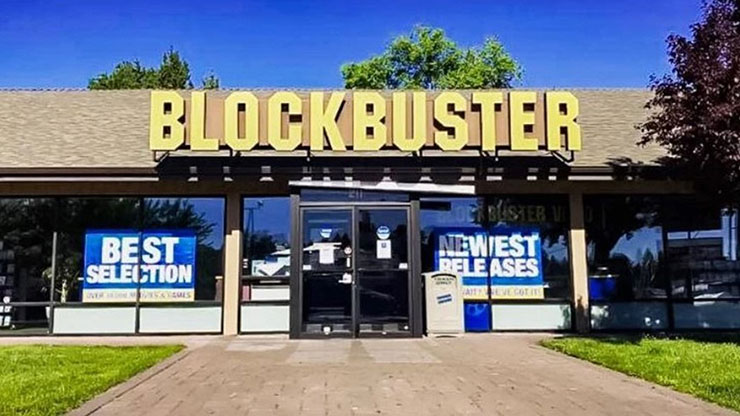
"The Last Blockbuster." Courtesy: 1091 Pictures/Netflix.
“The Last Blockbuster”: It remains to be seen whether or not “Nobody” will make a dent at the box office, but there's very little doubt that it would have been flying off the shelves at Blockbuster stores. This fanboy-ish nonfiction tribute traces the rise and fall of the corporate giant that changed the industry before becoming a casualty of it. It's also a portrait of the last store standing and the friendly “Blockbuster mom” who runs it. Relying too much on talking-head interviews with familiar faces for whom the retail chain played a formative role, director Taylor Morden and writer Zeke Kamm seldom take off their rose-colored glasses to register the negative impact the stores had, they way they phased out mom-and-pop businesses and whose family-friendly business model had no room for adult entertainment or more transgressive content. The filmmakers are too busy fetishizing VHS tapes and the store's layout to yield much insight into the company's carbon footprint.
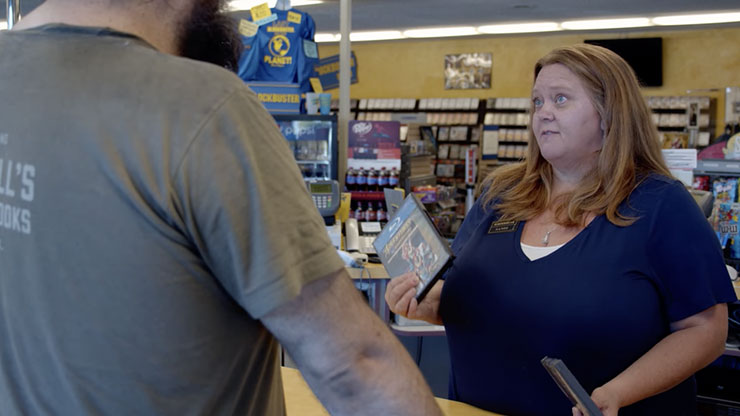
Sandi Harding in "The Last Blockbuster." Courtesy: 1091 Pictures/Netflix.
The documentary has a particularly soft spot for the 1990s, the time when Blockbuster reached the height of its cultural dominance, so it leans on advertisements and other cultural trappings of the period to help shape its sentimental approach to the subject. Among its interview subjects is Kevin Smith, whose debut feature, “Clerks,” partly takes place inside a video store. It's a shrewd move, since Smith has been a stronger raconteur than a filmmaker, the occasional “Tusk” and “Red State” notwithstanding, but it's also limiting. Ostensibly in the interest of including a dissenting voice, “The Last Blockbuster” features a brief interview with Lloyd Kaufman, the founder of Troma Entertainment, who has nothing but contempt for Blockbuster and all it represents. But his appearance amounts to comic relief, a feeble poke in the ribs exacerbated by the film's self-consciously wacky stabs at humor.
The Blockbuster story, its built-in cautionary tale about the pitfalls of American entrepreneurship, certainly merits the documentary treatment, but Morden and Kamm fumble the ball. Instead of weaving the company's meteoric rise (hello, Wayne Huizenga and Viacom) and slow-motion decline throughout the entire running time, they opt for a Cliffs Notes summary. The company's dealings with Netflix and the way it revolutionized the ways movie studios interacted with video retailers are explored, and those moments make for reasonably engaging viewing, but by the time the film reaches the store closings, it's only at roughly the halfway point. From that point on, it has nowhere to go but in circles, flitting from one topic to another with little rhyme or reason.
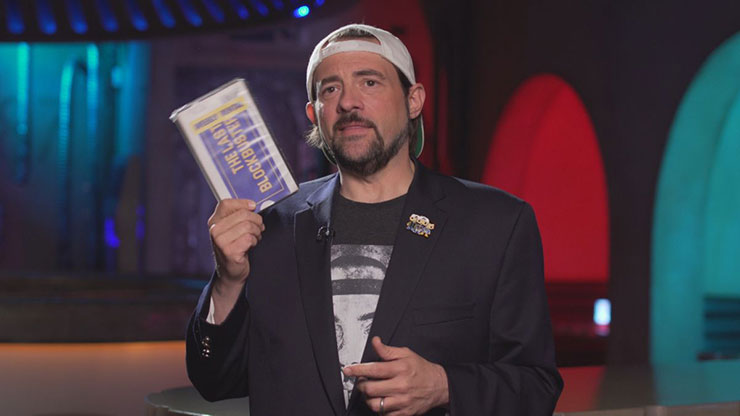
Kevin Smith in "The Last Blockbuster." Courtesy: 1091 Pictures/Netflix.
The sloppy structure doesn't obscure the scrappy likability of the film's vérité footage of the titular location in Oregon. That franchise store's general manager, Sandi Harding, is a disarming interview subject, a wholesome force of nature that represents the innate goodness of the people the company has drawn into the fold (or spider's web) since its inception. But despite Harding's warmth, in particular the way she opens her own home to the filmmakers, she remains at arm's length, mostly because the questions she's asked rarely go beyond what you'd expect from, say, a newspaper article with limited space.
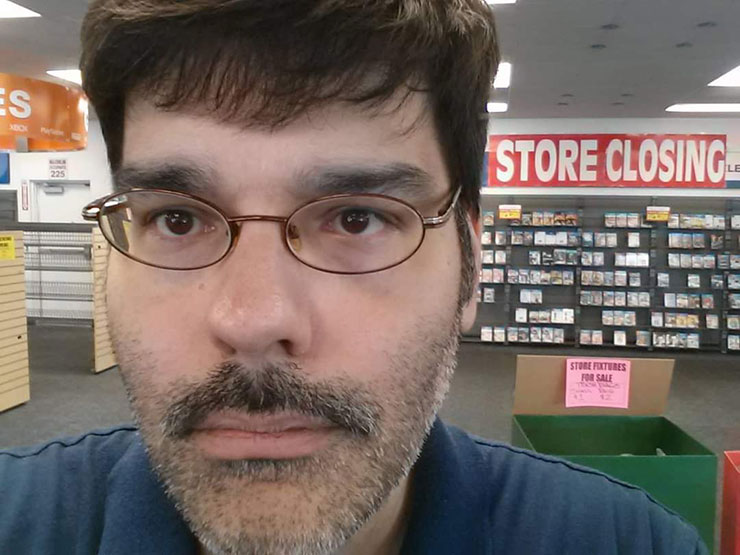
Ruben Rosario, on his last day as a Blockbuster employee, Dec. 8, 2013.
What's missing here is the kind of context that could have come from a filmmaker determined not to put Blockbuster on a pop culture pedestal. Morden and Kamm have crafted a walk down memory lane that only tells you what the filmmakers think you want to hear. When faced with the prospect of saying something critical (and more insightful) about their subject, they'd rather say nothing at all.
“Nobody” is now playing in wide release, including Dolby Theater engagements at local AMC Theatres locations. After premiering on various streaming platforms back in December, “The Last Blockbuster” is now available through Netflix, a bitter irony likely not lost on anyone.
 MAIN MENU
MAIN MENU

